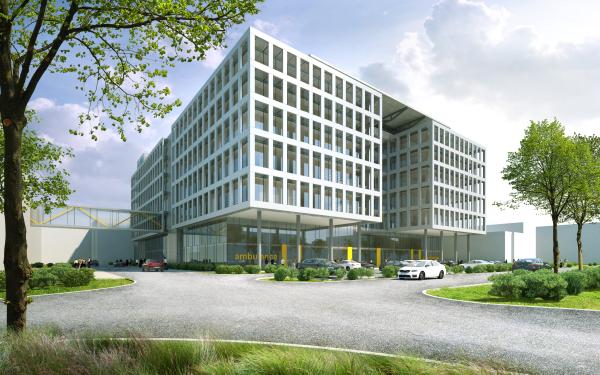Egypt: MOIC, EU, EIB and MSMEDA launch the second phase of Community Development Program
- EGP 111m will be invested in five governorates under phase two
- EGP 113m are being invested in six governorates under phase one
The Ministry of International Cooperation (MOIC), the European Union (EU), the European Investment Bank (EIB) and the Micro, Small, and Medium Enterprises Development Agency (MSMEDA) have launched the second phase of the community development program with a total financing of EGP 111 million. In the framework of the second phase, MSMEDA signed Framework agreements with five Egyptian governorates to support the provision and enhancement of community facilities, including drinking water networks, sewage networks, paving side roads with interlocking paving, schools, health clinics, and youth centres.
The Community Development Program (CDP) aims at financing investments in community infrastructure to improve living standards for disadvantaged and vulnerable persons living in and around urban centres in several Governorates in Egypt. The program answers multiple Sustainable Development Goals (SDGs) including Decent Work and Economic Growth, Industry, Innovation, Infrastructure and Sustainable Cities and Communities.
The CDP is funded by a EUR 15 million grant from the European Union under the Neighbourhood Investment Facility (NIF) and is delegated to the European Investment Bank. It is implemented in two phases: phase one, worth EGP 113m million, which is focused on the projects to be completed by the end of 2020, while phase two worth EUR 111m is focused on works that will be completed by the end of 2023.
Under phase two of the program, MSMEDA signed framework agreements totalling EGP 111 million with five governorates. The projects financed under phase two include the upgrade of 1.75 km of water supply networks in Assiut, The extension and upgrade of 32.1 km of sanitation networks services in Assiut, Giza, Port Said and Sharkia. The improvement of side roads quality and safety in Assiut, Giza and Alexandria, and upgrade of a local market in Alexandria.
Minister of International Cooperation, H.E. Dr. Rania Al Mashat noted “Investing in sustainable and resilient infrastructure is an investment in human capital and the productivity of our nation. The Ministry of International Cooperation continues working closely with the EU and the EIB to provide sustainability-focused and community-based solutions paving the way to inclusive and enabled economic growth. The two phases of the community development program with MSMEDA stimulate sectors that are labour intensive accelerating job creation and generating employment opportunities”.
Dario Scannapieco the EIB Vice President commented on the launch of the second phase “As the EU bank, we continue to support a sustainable, modern economy in Egypt and to reinforce its economic resilience. The Community Development Program is progressing in a very satisfactory manner. Under phase one of the program, MSMEDA signed financing agreements totalling EGP 113 million with six governorates. The projects financed under phase one included the rehabilitation of five health centres in Menofeya, Assyout and Sharkia. The modernisation of 17 schools in Giza, Menofya and Port Said. The extension and upgrade 34 km of water supply networks in Alexandria, Giza, Menofya and Sharkia, The extension and upgrade 14.7 km of sanitation networks services in Assiut and Alexandria. The improvement of side roads quality and safety in Menofya and Sharkia using interlocking paving for narrow roads 83000 m2. And the modernisation of a youth center in Port Said. Further investments in these sectors will be supported with the financing of phase two”.
Ivan Surkoš, Ambassador of the EU to Egypt, said “The European Union remains committed to supporting Egypt in its sustainable development goals under the Egypt Vision 2030 and in particular under the Urban Development Pillar. With our partners EIB and MSMEDA, we are contributing to enhancing quality of life of the communities targeted under the “Community Development Programme” through tangible improvements in the municipal infrastructure of a number of cities across Egypt. EU-Egypt partnership is concretely delivering and making collectively a difference at the ground level and we stand ready to increase our investment in the future to make the cities of Egypt and its inhabitants more resilient and prosperous”.
Eng. Medhat Massoud the GM and head of the Human & Community Development Central sector within MSMEDA said “the second phase of the Community Development program comes as an important module and one of several programs and projects managed by MSMEDA in full partnership with the European Delegation in Cairo and the EIB. The program is fully aligned with MSMEDA and the Egyptian Government strategic objectives in supporting the enabling environment for the growth and development of the small and micro enterprise in the country. While enhancing the living conditions in the targeted geographical areas, MSMEDA applies labour intensive methodology during the executing the community infrastructure sub-projects to generating the maximum employment opportunities. The list of sub-projects represents the targeted communities’ urgent priorities.”
Eng. Massoud added that “During the implementation phase one and two, the big challenge was how to protect the workers on the different sites at the various governorates against the spreading of Epidemic COVID-19, a guide was prepared by MSMEDA and disseminated to all the contractors and workers to abide with these high and conservative protective measures against COVID-19.”


